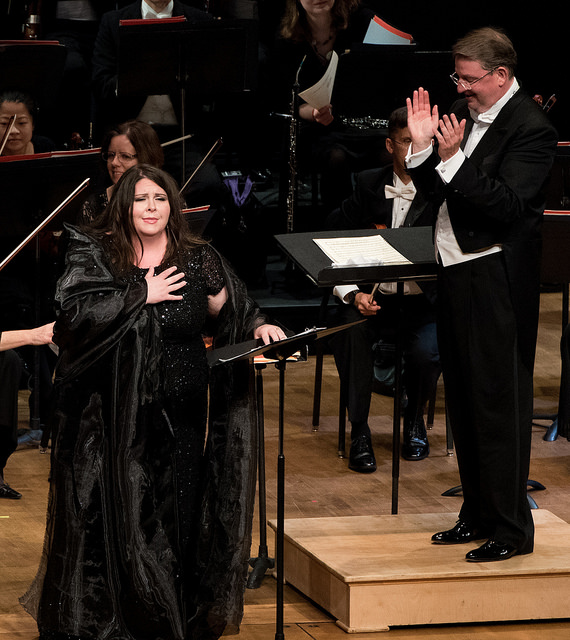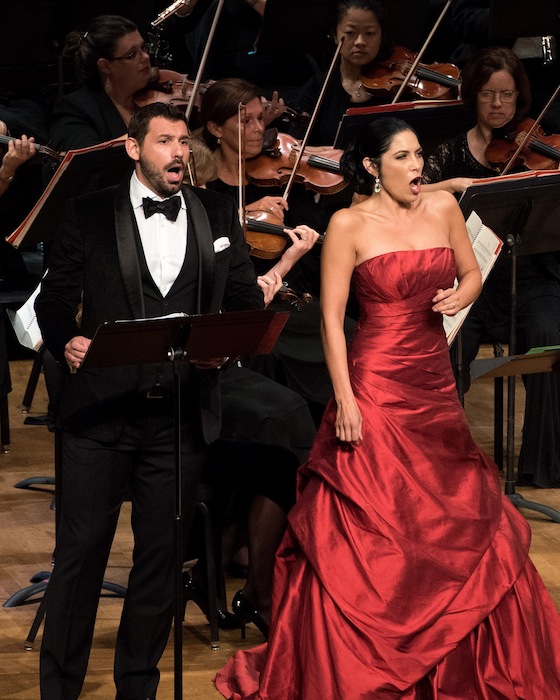Washington Concert Opera marks 30 years with a bel canto feast

Conductor Anthony Walker applauds Angela Meade at Washington Concert Opera’s 30th anniversary gala Sunday night at Lisner Auditorium. Photo: Don Lassell
As its title suggests, Washington Concert Opera has been performing opera sans staging since 1986. The organization marked its 30th anniversary with a gala concert Sunday evening at Lisner Auditorium. Conductor Antony Walker was also celebrating his 15th season as WCO’s artistic director. As usual he brought together an excellent group of singers, this time for a program of mostly bel canto arias and duets.
The headliner was Angela Meade, a soprano of dramatic strength and natural musical skills. She opened with “O beau pays” from Meyerbeer’s Les Huguenots, a punishing slow aria featuring miles of exposed, high pianissimo writing, followed by equally demanding fast runs. Meade was up to all the challenges, perhaps holding back just slightly on some of the highest notes, as if saving some of her strength.
In the cavatina of the Act II finale from Bellini’s Il Pirata, the soprano deployed a masterful crescendo on a high note from pianissimo to forte, as well as shimmering chromatic runs up and down the scale. Not only does the robust sound of Meade’s chest voice continue to grow, the top C at the end of the cabaletta was focused like a laser. Even finer still was a smooth but intense rendition of “Qui la voce sua soave” from Bellini’s I Puritani, accompanied by wistfully muted strings and winds in the orchestra. Meade caressed all of the rubato stops and starts in the fast section with poise, matched step for step by Walker at the podium.
The consistently sweet voice of tenor Michele Angelini produced the most authentically “bel canto” sound of the evening. In “Viens, gentille dame” from Boieldieu’s La Dame Blanche, he gave the line of the melody impeccably clean intonation and tone quality, not to mention superb French pronunciation. The repeated high C’s in “Ah! mes amis” from Donizetti’s La Fille du Régiment were light but precisely placed. Runs were not always as clean as they could be, with the notable exception of those in Angelini’s bravura reading of “Intesi, ah! tutto intesi” from Rossini’s Il Turco in Italia.

Tenor Michele Angelini and mezzo-soprano Vivica Genaux perform at the Washington Concert Opera gala. Photo: Don Lassell
The vibrato of mezzo-soprano Vivica Genaux seems more pronounced each time she comes to Washington. (Is this connected to the fluttering movement of her lips as she sings?). In slow pieces like “Il segreto per esser felice” from Donizetti’s Lucrezia Borgia, the vibrato undermined the clarity of the tone. In more active pieces like “Amour, viens rendre à mon âme” from Gluck’s Orfeo ed Euridice, it helped her delineate the individual notes. Hers is not a large voice, but Walker made sure to keep the volume of the orchestra to a level that did not cover her.
Baritone Javier Arrey did not sound quite as strong as he did last spring, when he sang in WCO’s La Favorite. The placement went slightly nasal, causing intonation to go awry at some points. The duet “Au fond du temple saint” from Bizet’s Les Pêcheurs de Perles, with tenor Jonas Hacker, was a little too plain-spun.
The WCO orchestra roster changes with each performance, and there were a few rough edges. Fine solos from the harp, horns, and flute alternated with ragged moments in the violins and cellos. The concert opener, the overture from Rossini’s La Gazza Ladra, can have a scintillating effect with the most banal material, but here it felt just a little labored.
Angelini served double duty in two concluding love duets of a different kind. In the Act II opening duet from Lucrezia Borgia, he was Gennaro to Genaux’s Orsini, two men who vow to remain together in life no matter what happens. Against Genaux, Angelini had the upper hand vocally, but in the final duet from Lucrezia Borgia, the lyric nature of his voice paled somewhat against Meade in the more heroic passages. Meade brought exceptional pathos and vitality to the role of Lucrezia in this duet, as she realizes she has unwittingly poisoned Gennaro, whom she reveals is her illegitimate son. All the power Meade had seemed to hold in reserve earlier was now unleashed.
Washington Concert Opera presents Massenet’s Hérodiade 6 p.m. November 20. concertopera.org
